|
|
|
Sort Order |
|
|
|
Items / Page
|
|
|
|
|
|
|
| Srl | Item |
| 1 |
ID:
105691
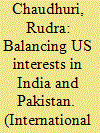

|
|
|
|
|
| Publication |
2011.
|
| Summary/Abstract |
Convincing the Pakistani military to focus its attention on the Afghan Taliban and associated groups has so far proved unsuccessful. The Obama administration's reliance on economic incentives and regional peace initiatives, such as a dialogue with India on Kashmir, has failed to deliver tangible results. Instead, India's footprint within Afghanistan has expanded, leaving Pakistani elites ever more anxious. Balancing Indian and Pakistani interests in South Asia remains a top priority for Western governments, and most importantly the US. In the current milieu this will require shifting Western bureaucratic focus from the age old and seemingly intractable Kashmir dispute to maintaining the peace within Afghanistan. This article outlines why this shift should be considered, and how the India--Pakistan trust deficit might be bridged.
|
|
|
|
|
|
|
|
|
|
|
|
|
|
|
|
| 2 |
ID:
103293


|
|
|
|
|
| Publication |
2011.
|
| Summary/Abstract |
Success in war depends on alignment between operations and strategy. Commonly, such alignment takes time as civilian and military leaders assess the effectiveness of operations and adjust them to ensure that strategic objectives are achieved. This article assesses prospects for the US-led campaign in Afghanistan. Drawing on extensive field research, the authors find that significant progress has been made at the operational level in four key areas: the approach to counterinsurgency operations, development of Afghan security forces, growth of Afghan sub-national governance and military momentum on the ground. However, the situation is bleak at the strategic level. The article identifies three strategic obstacles to campaign success: corruption in Afghan national government, war-weariness in NATO countries and insurgent safe havens in Pakistan. These strategic problems require political developments that are beyond the capabilities of the International Security Assistance Force (ISAF). In other words, further progress at the operational level will not bring 'victory'. It concludes, therefore, that there is an operational-strategic disconnect at the heart of the ISAF campaign.
|
|
|
|
|
|
|
|
|
|
|
|
|
|
|
|
| 3 |
ID:
158430


|
|
|
|
|
| Summary/Abstract |
Political scientists and analysts have long argued that Indian strategic restraint is informed primarily by Indian political leaders’ aversion to the use of force. For some scholars, India’s apparent fixation with restraint can be traced to the very foundation of the modern Indian state. This article contests what it considers to be a reductionist position on strategic restraint. Instead, it argues that Indian strategic restraint has in fact been shaped more by structural issues such as the limited availability of logistics and capabilities, the impact of domestic political contest, the effect of international attention to a crisis and the need for international legitimacy, and the political, economic, and military cost-benefit analysis associated with the use of force and the potential for escalation. In sum, it contributes a historically grounded understanding of strategic restraint. The article looks closely at India’s decision-making process in one major experiment with the use of force against Pakistan in 1965. The case clearly shows that political leaders were hardly uncomfortable or unsure about the use of force. It was the military leadership at the time that sought to temper the ambitious and potentially escalatory policies considered by the then prime minister.
|
|
|
|
|
|
|
|
|
|
|
|
|
|
|
|
| 4 |
ID:
074055


|
|
|
| 5 |
ID:
164660
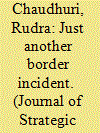

|
|
|
|
|
| Summary/Abstract |
The India–Pakistan War of September 1965 has attracted little attention in the larger body of work on South Asia. Further, almost nothing has been written on the earlier skirmish, in April 1965, between Indian and Pakistani security forces in the Rann-of-Kutch, an uninhabited salt marsh. This article argues that the limited conflict in the Rann, its immediate consequences, and its impact on Pakistani military and civilian leaders were central to Pakistan’s consideration of a military solution to the ongoing dispute in Kashmir, which then led to Indian retaliation and the outbreak of war.
|
|
|
|
|
|
|
|
|
|
|
|
|
|
|
|
| 6 |
ID:
114255


|
|
|
|
|
| Publication |
2012.
|
| Summary/Abstract |
This article explores the extent to which Indian domestic debate shapes strategic behavior. It makes the case that domestic politics, and more importantly, the role played by domestic elites-from within the ruling party and the opposition-have historically set limits on the exercise of executive power. Specifically, it maps the relative importance of domestic politics on Indian foreign policy during the Nehru years (1947 to 1964), investigating the tension between elite domestic contestation and India's approach to alliances. In sum, it seeks to recover a part of Indian strategic history that appears to have fallen prey to a dominant historical narrative that is wrapped around the persona, rhetoric, and vision of Prime Minister Jawaharlal Nehru.
|
|
|
|
|
|
|
|
|
|
|
|
|
|
|
|
| 7 |
ID:
100640
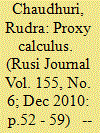

|
|
|
|
|
| Publication |
2010.
|
| Summary/Abstract |
The subject of Kashmir was side-stepped during President Obama's recent state visit to New Delhi, but it nevertheless continues to exercise both India and Pakistan, frustrating relations between South Asia's two nuclear powers. Barriers to its resolution stubbornly remain. Meanwhile, the proxy calculus has shifted to Kabul. Rudra Chaudhuri argues that both international and regional efforts must focus on Indo-Pakistani relations in Afghanistan.
|
|
|
|
|
|
|
|
|
|
|
|
|
|
|
|
| 8 |
ID:
161043
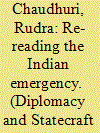

|
|
|
|
|
| Summary/Abstract |
The period known as the “Emergency” in India—June 1975 to March 1977—is widely recognised as one of the darkest episodes in the nation’s 70-year history. Fundamental rights were suspended, whilst the courts had little or no authority. The security services received emergency powers to make arrests without explanation. Although the political, social, and economic history of the Emergency remains well known, there is nothing on the international history of this period. This analysis provides the first contribution to its diplomatic history. Examining the role played by the United States and Britain, in particular, finds basis largely on declassified papers available in the Indian, American, and British national archives as well as a survey of over 300 newspaper articles on and around the Indian Emergency.
|
|
|
|
|
|
|
|
|
|
|
|
|
|
|
|
| 9 |
ID:
079717


|
|
|
|
|
| Publication |
2007.
|
| Summary/Abstract |
The scope of the article is to examine Operations 'Enduring Freedom' and
'Iraqi Freedom' (OEF and OIF) by assessing the merits and demerits of a
process the Bush administration seems to have unequivocally endorsed.
The paper will argue that although Donald Rumsfeld's vision for transformation
has allowed the military to achieve certain objectives during the
destructive phase of war, it has failed to recognize the importance of
stretching the effects-based canvas of war to include post-conflict stabilization
operations. The paper will conclude by arguing that the unilateralist
tendencies of the Bush administration, the spirit of which has been
extended to its defence doctrine, unless re-oriented, will undermine the
effectiveness of America's ability to annihilate conventional and unconventional
adversaries
|
|
|
|
|
|
|
|
|
|
|
|
|
|
|
|
| 10 |
ID:
066951


|
|
|
| 11 |
ID:
090414
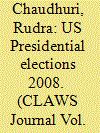

|
|
|
|
|
| Publication |
2008.
|
| Summary/Abstract |
For almost a year, the debate on the N deal has made clear the polarised, and sometimes wavering, positions held by the three most significant sub-cultures of India's national body-politik. These include the left, who oppose the operationalisation of 123 agreement; Bhartiya Janta Party (BJP), which, according to party head L K Advani, will consider supporting the Congress only if certain laws are amended to prevent the Hyde Act from applying to India.
|
|
|
|
|
|
|
|
|
|
|
|
|
|
|
|
| 12 |
ID:
164656


|
|
|
|
|
| Summary/Abstract |
This Special Issue looks at the importance of institutions and the role played by international actors in crucial episodes of India’s strategic history. The contributions trace India’s tryst with war and peace from immediately before the foundation of the contemporary Indian state to the last military conflict between India and Pakistan in 1999. The focus of the articles is as much on India as it is on Pakistan and China, its opponents in war. The articles offer a fresh take on the creation of India as a regional military power, and her approach to War and Peace in the post-independence period.
|
|
|
|
|
|
|
|
|
|
|
|
|
|
|
|
| 13 |
ID:
092950
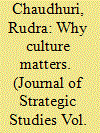

|
|
|
|
|
| Publication |
2009.
|
| Summary/Abstract |
Strategic historians and practitioners associated with the 32-day Sino-Indian border conflict of autumn 1962 have for long argued that India's appeal for US military assistance during the war led to the abandonment of India's foreign policy of non-alignment. By asking for military assistance, India entered into an alliance with the US. Triangulation of different accounts of the war, declassified US State Department Papers and correspondence between Indian leaders during the time of the war counter these claims. This article demonstrates how India's political elite, informed by cultural beliefs had in fact resisted allying with the US. Cultural beliefs, and not rational claims prescribing alliances, guided the strategic decision-making process in this period of national security crisis.
|
|
|
|
|
|
|
|
|
|
|
|
|
|
|
|
|
|
|
|
|